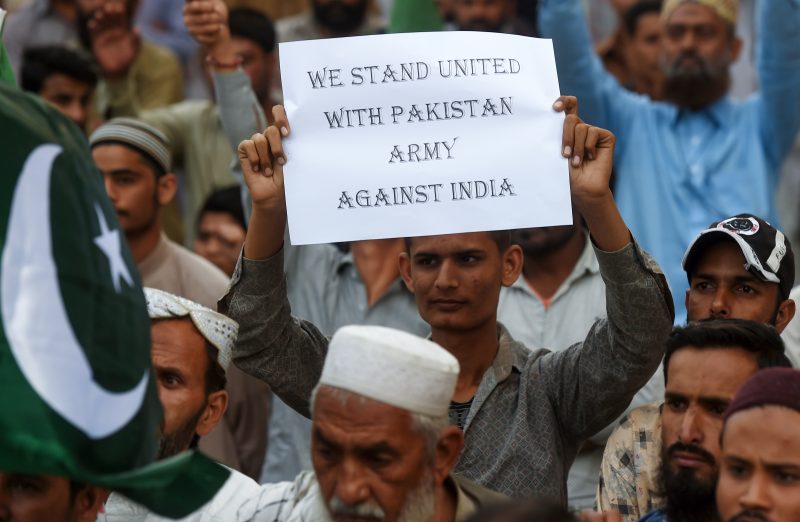US patience thins with Pakistan as India goes on offense
A supporter of the group Sunni Tehreek holds a placard during an anti-Indian protest in Karachi (ASIF HASSAN)
Washington (AFP) – As conflict between India and Pakistan escalates to near all-out war, the United States has been thrust into a familiar position of hoping to defuse tensions — but is making no secret it faults Islamabad.
US policymakers have grown exasperated with Pakistan for not doing more against Islamist extremists and envision a broad, long-term alliance with an emerging India — a stark flip from the Cold War when Washington sided with Pakistan.
Secretary of State Mike Pompeo, in a statement after calls with his two counterparts, urged restraint from both sides as India and Pakistan shot down each other’s warplanes.
But in language that would be carefully parsed, Pompeo described the initial strikes by India as “counter-terrorism actions” and urged Pakistan to take “meaningful action against terrorist groups operating on its soil.”
India was responding to a February 14 suicide attack in divided Kashmir that killed 40 of its troops. For the first time since 1971, India hit Pakistan in territory beyond Kashmir, the Himalayan region that has triggered two of the rivals’ three full-fledged wars.
Asad Majeed Khan, Pakistan’s ambassador to Washington, criticized the statement for not reprimanding India — where Prime Minister Narendra Modi, whose Hindu nationalist base is staunchly anti-Pakistan, faces imminent elections.
The statement “is construed and understood as an endorsement of the Indian position and that is what emboldened them even more,” Khan said.
President Donald Trump has shown no sympathy for Pakistan, last year cutting $300 million in military aid that had been flowing over logistical assistance to US forces in Afghanistan.
Trump — who has championed the US right to act as it pleases — said last week that Pakistan had been “taking very strong advantage of the United States” and voiced understanding that India was planning “something very strong.”
– How much US attention? –
Trump said Thursday after the nuclear summit with North Korea in Hanoi that the US was working to defuse the conflict.
“They’ve been going at it, and we’ve been involved in trying to have them stop, and we have some reasonably decent news, I think, hopefully, that will be coming to an end,” he told a news conference.
Richard Olson, who served as US ambassador to Islamabad from 2012 to 2015, said there was a growing sense among policymakers that militants coming out of Pakistan were “really a fundamental problem.”
“Defining the issue in terms of counter-terrorism indicates something of a harder line than had been adopted, at least publicly, in the past,” said Olson, now a senior advisor at the US Institute of Peace.
But Pompeo placed calls while heading to the summit with North Korea in Hanoi, his statement coming nearly 24 hours after the Indian strikes.
And while US military officials maintain strong ties with Pakistani and Indian counterparts, the Trump administration has no confirmed defense secretary, ambassador in Islamabad or assistant secretary of state for South Asia — all positions key in a crisis.
Khan, the Pakistani ambassador, nonetheless said there was “no other country better placed than the United States” to play a role owing to its relationships.
Pakistan has increasingly relied on China for diplomatic and economic support, but Beijing holds little sway over India.
The United States, France and Britain are asking the UN Security Council to impose sanctions on the leader of Jaish-e-Mohammed, the Pakistan-based group that claimed responsibility for the Kashmir attack, although China blocked two earlier attempts.
Pakistan banned Jaish-e-Mohammed after a 2001 attack on the Indian parliament triggered an earlier standoff, but the group still operates openly under different names.
– US could raise pressure –
Pakistan points out that the culprit behind the latest bombing was a local Kashmiri and says it is happy to hold dialogue with India.
“Everybody is tired of hearing, essentially, excuses,” said Alyssa Ayres, a former deputy assistant secretary of state for South Asia, adding that Pakistan also offered talks rather than action after the bloody 2008 siege of Mumbai.
Ayres, a senior fellow at the Council on Foreign Relations, said he United States could take tougher action including revoking Pakistan’s status as a major non-NATO ally or holding up a bailout from the International Monetary Fund, where the cash-strapped country is again seeking help.
“I can’t say if Pakistan will respond in the right way. But I do think that we haven’t tried all of the leverage we could,” she said.
President Bill Clinton raised the prospect of blocking IMF support to Pakistan when he negotiated an end to the 1999 Kargil crisis, with Pakistan-backed forces withdrawing from incursions in Kashmir.
Pakistan also has leverage — Afghanistan, where it is facilitating the Taliban’s negotiations as Trump seeks to end nearly 18 years of war.
But Olson, the former ambassador, doubted the United States would switch tack over Afghanistan.
“Preventing an escalation of a conflict between nuclear-weapons states will take priority over just about anything else — and it should,” he said.
Disclaimer: This story is published from a syndicated feed. Siliconeer does not assume any liability for the above story. Validity of the above story is for 7 Days from original date of publishing. Content copyright AFP.


